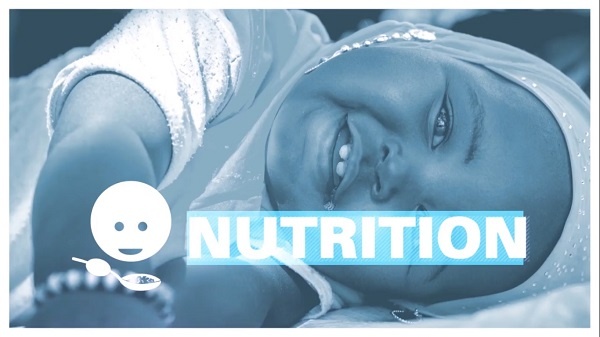
Three-year initiative aims to support the Government of Ethiopia in preventing acute malnutrition among children and mothers in 100 woredas and promoting health and nutrition in 600 schools
ADDIS ABABA – The United Nations Children’s Fund (UNICEF) and World Food Programme (WFP) have launched a three-year partnership in Ethiopia to support the Government in preventing acute malnutrition in children and mothers and provide school-based nutrition and health services.
The first-of-its-kind partnership underlines the urgency of preventing acute malnutrition in Ethiopia, which has seen insufficient progress over the past two decades, and where malnutrition levels are likely to be exacerbated by the COVID-19 pandemic, the ongoing desert locust infestation, and persistent climate-related crises such as floods and droughts.
This year, 4.4 million people in the country will require treatment for severe and acute malnutrition – 2.7 million children and 1.7 million pregnant and breastfeeding women.
Both agencies believe that sustained and intensive action is required, combining school and community-based prevention activities with expanded access to treatment for children and mothers with acute malnutrition in selected hotspot woredas (districts). This approach would help Ethiopia move towards the goal of decreasing acute malnutrition in children from nearly 10 percent to less than three percent by 2030.
The UNICEF-WFP initiative targets 100 of the most vulnerable woredas in Afar, Amhara, Oromia, Southern Nations Nationalities and Peoples, Somali and Tigray regions. The two agencies aim to:
- support the Government to provide integrated services to manage acute malnutrition in 100 woredas;
- ensure that at least 70 percent of these services increase knowledge and change for the better the feeding practices of pregnant and breastfeeding women, caregivers and adolescents;
- deploy and scale up at least three innovations and research on preventing acute malnutrition;
- provide health and nutrition information to at least 600 schools in Afar and Somali regions; and
- provide school feeding to 200,000 children in Afar and Somali regions.
“We are concerned that millions of children remain susceptible to malnutrition, and we are already seeing worrying signs of increased malnutrition due to COVID-19 and the desert locust infestation,” says UNICEF Representative Adele Khodr. “We are, however, convinced that in working together smartly and differently, we can support the Government of Ethiopia to drastically prevent the root causes of malnutrition and reach every child and mother who requires treatment for malnutrition.”
“The Government is investing heavily in the nutrition, health and education of current and future generations of Ethiopians,” said Steven Were Omamo, WFP Representative and Country Director. “We are confident that this new partnership will add importantly to those efforts and thereby contribute to the Government’s vision of social and economic transformation in Ethiopia.”
For Ethiopia to meet the Sustainable Development Goal of eradicating hunger and malnutrition, the annual rate of reduction in acute malnutrition needs to increase tenfold. Stepping up investments in preventing hunger and malnutrition is seen as a key part of this effort and it will greatly reduce current costs related to treating malnutrition.
With this partnership, it is envisaged that UNICEF and WFP will support the Government of Ethiopia to significantly reduce malnutrition by leveraging Ethiopian food systems to increase consumption of diets rich in nutrients among children and mothers, reducing inequities in access to food, improving targeting of vulnerable households, enhancing awareness and adoption of optimal feeding practices, and innovating with local solutions.
For more information, contact:
Victor Chinyama, UNICEF, Tel: +251 911 255 109; vchinyama@unicef.org
Wossen Mulatu, UNICEF, Tel: +251 911 308483; wmulatu@unicef.org
Edward Johnson, WFP, Tel: +251 935 998 863; edward.johnson@wfp.org
Peter Smerdon, WFP/Nairobi, Mob. +254 707 722 104; peter.smerdon@wfp.org
About UNICEF
UNICEF works in some of the world’s toughest places, to reach the world’s most disadvantaged children. Across more than 190 countries and territories, we work for every child, everywhere, to build a better world for everyone. For more information about UNICEF and its work for children visit www.unicef.org.
◌ Follow UNICEF on Twitter and Facebook
About WFP
The United Nations World Food Programme is the world’s largest humanitarian organization, saving lives in emergencies, building prosperity and supporting a sustainable future for people recovering from conflict, disasters and the impact of climate change.
◌ Follow us on Twitter: WFP Africa and WFP Ethiopia
Source: reliefweb
